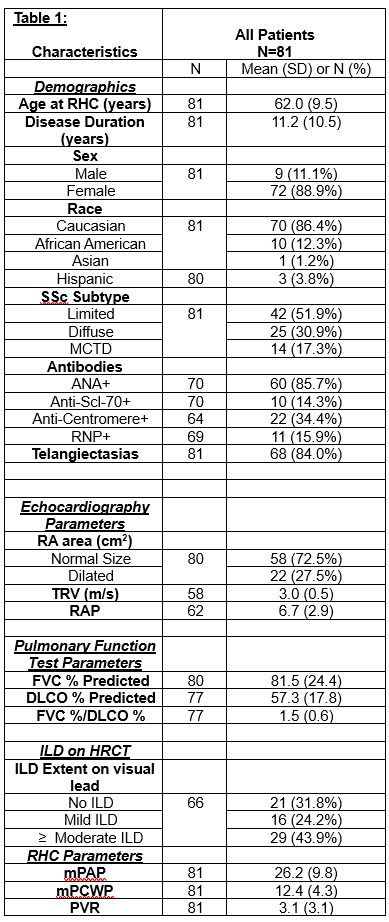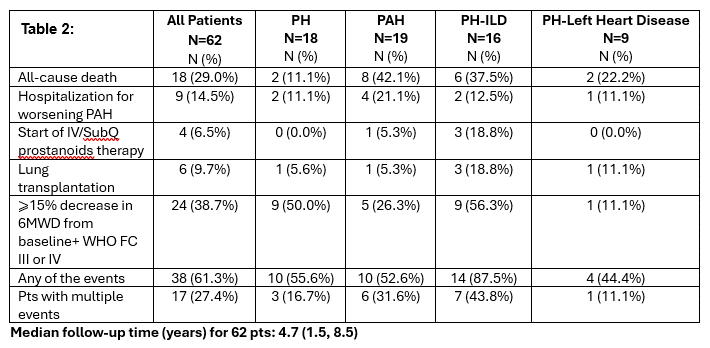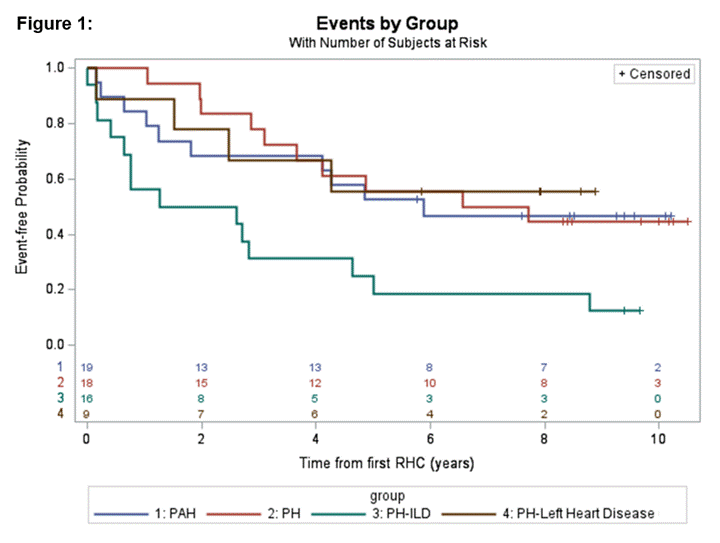Session Information
Session Type: Poster Session A
Session Time: 10:30AM-12:30PM
Background/Purpose: Pulmonary hypertension (PH) is a leading cause of mortality in systemic sclerosis (SSc). We launched an IRB approved prospective study (NOVEL) in 2013 at a single center in SSc population. The prevalence of PH and long-term outcomes were assessed. In 2022, new hemodynamic definitions for PH were published [1]. Our objectives were to 1. Define the prevalence of PH subgroups based on 2022 classification 2. Assess longterm outcomes in the NOVEL cohort.
Methods: Under NOVEL, SSc patients at increased risk of developing PH underwent right heart catheterization (RHC). Key inclusion criteria included 1. Resting echocardiogram with tricuspid regurgitation jet >2.8m/s or right ventricular dysfunction OR 2. Pulmonary function testing (PFT) with abnormal diffusion capacity of carbon monoxide not due to interstitial lung disease (ILD) [DLCO < 60% predicted or FVC:DLCO > 1:4]. Active smokers, ejection fraction < 50% or prominent diastolic dysfunction, and patients on PH treatments for Raynaud’s were excluded.
Outcomes were defined based on consensus definition of events [2]:
1.) ≥ 15% decrease in 6-minute hallwalk distance from baseline and World Health Organization Class 3 or 4
2.) Hospitalization for worsening PH
3.) Initiation of intravenous or subcutaneous prostanoid therapy
4.) Lung transplantation or atrial septostomy
5.) All-cause death
Demographics and baseline characteristics including SSc-related data, RHC, echocardiogram, PFT parameters, and ILD extent were tabulated. Mean and standard deviation (SD) were reported for numeric variables, and count and percentage were reported for categorical variables. End measures were summarized by reporting count and percentage of each event. Kaplan-Meier curve was plotted to show the event-free survival probability.
Results: 81 patients underwent RHC over a period of 6-years. 89% were women, 52% had limited cutaneous SSc, mean pulmonary arterial pressure (mPAP) and pulmonary vascular resistance (PVR) were 26.2 and 3.1, respectively.
Under 2022 guidelines, 62 were classified as abnormal hemodynamic pressures, and 19 had normal pressures. 18 of 62 patients had an elevated mPAP >20 but PVR < 2, indicating elevated hemodynamics without meeting a specific subcategory of PH (elevated pulmonary pressure subgroup).
Over a median (IQR) follow up 4.7(1.5, 8.5) years, 62 patients had data to assess events. 10 PAH (52.6%), 14 PH-ILD (87.5%), and 4 PH-left heart disease (44.4%) patients met at least one event (Table 2, Figure 1). 18 deaths occurred during the follow up. The main causes of death included progressive PAH (3), progressive PH-ILD (2), and other (13) [malignancy 3, gastrointestinal 4, sepsis 1, post-operative complications 1, renal failure 1, pulmonary embolism 1, unknown 2]. Patients with elevated pulmonary pressure subgroup (mPAP >20 but PVR < 2) also had a progressive phenotype with 10 patients (55.6%) meeting at least one event at median (IQR) 7.1 (3.1, 9.7) years.
Conclusion: PH in SSc, including elevated pulmonary pressure subgroup, is a progressive disease. PH-ILD patients had worse outcomes which is consistent with published trends. Despite aggressive management and earlier detection, there continues to be high morbidity and mortality.
To cite this abstract in AMA style:
Zahn C, Visovatti S, Gedert R, Huang S, Moles V, Young A, McLaughlin V, Khanna D. Single Center Prospective Cohort of Systemic Sclerosis Patients Who Are At-Risk for Pulmonary Hypertension [abstract]. Arthritis Rheumatol. 2024; 76 (suppl 9). https://acrabstracts.org/abstract/single-center-prospective-cohort-of-systemic-sclerosis-patients-who-are-at-risk-for-pulmonary-hypertension/. Accessed .« Back to ACR Convergence 2024
ACR Meeting Abstracts - https://acrabstracts.org/abstract/single-center-prospective-cohort-of-systemic-sclerosis-patients-who-are-at-risk-for-pulmonary-hypertension/



